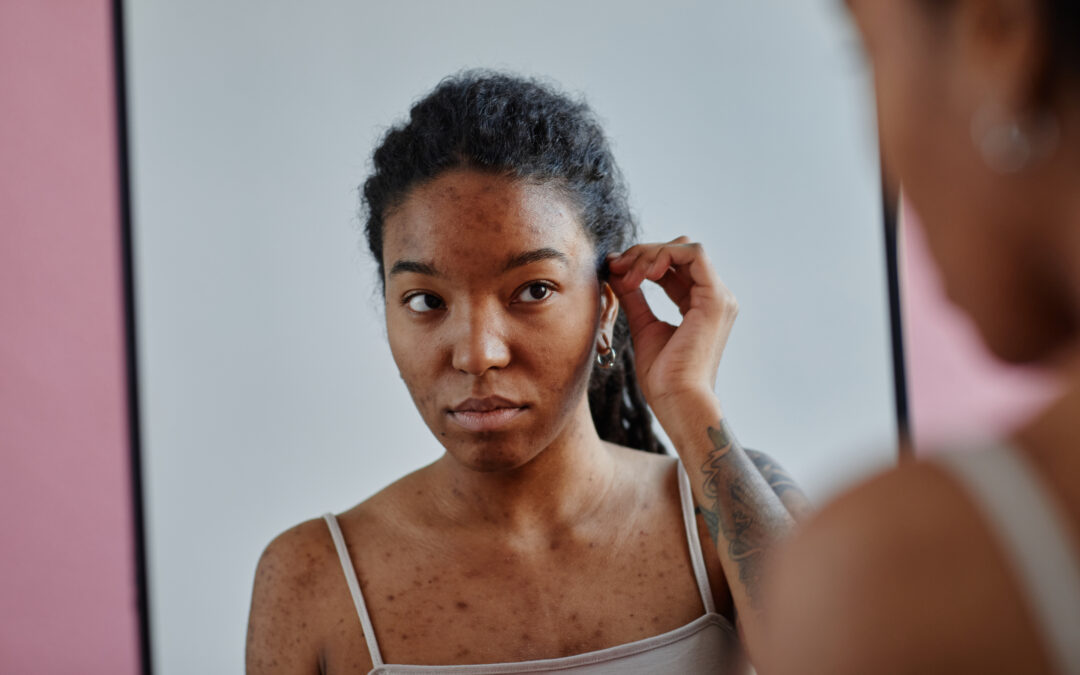As registered dietitians, we understand that those struggling with eating disorders and disordered eating often have an internal dialogue, known as the “eating disorder voice.” This voice can be LOUD, persistent, and overwhelming, leading to harmful behaviors and negative self-talk. But fear not! There’s another voice within us, known as the “Wise Mind” or healthy voice, that offers a more balanced and compassionate approach to food and our bodies. In this blog, we’ll explore the differences between these two voices and offer tips on how to cultivate a stronger healthy voice. Let’s get started!
Table of Contents
What is the Eating Disorder Voice?

The eating disorder voice is the internal dialogue that drives disordered eating behaviors. It’s often characterized by negative self-talk, criticism, and a pursuit of thinness. This voice can be incredibly persuasive and convincing, leading to harmful habits such as restriction, binge eating, and purging.
Here are some common thoughts associated with the eating disorder voice:
- “I can’t eat that, it’s too many calories.”
- “I need to exercise more to burn off what I ate.”
- “I’m such a failure for eating that.”
- “I need to lose weight to be happy.”
The eating disorder voice may present in many different tones, including:
- Promising: If you workout you can have more dessert.
- Persuasive: If you just lose weight, you’ll be happier and 99% of your problems will be solved.
- Fear: If you don’t count calories, you will gain weight.
- Self-Criticism: You’re lazy and lack willpower. I can’t believe you ate that- no wonder you didn’t get an A in english class.
- Translations: If they say you look healthy- they really just mean “look how much weight you’ve put on.”
- Denial: My body only needs a little amount of calories.
What is the Wise-Mind or Healthy Voice?
The Wise-Mind or healthy voice is the opposite of the eating disorder voice. It’s the voice of reason, compassion, and balance. This voice is focused on taking care of ourselves and making choices that align with our values, goals, and recovery!
Here are some examples of thoughts associated with the Wise-Mind or healthy voice:
- “I eat consistently to nourish my body so I can have energy and feel my best.”
- “I’m going to honor my hunger and fullness cues and eat when I’m hungry.”
- “My worth is not determined by my weight or what I eat.”
- “I don’t have to exercise in order to eat that cookie, I can have the cookie at any time!”
How to Strengthen the Healthy Voice
The good news is that the healthy voice can be strengthened over time with practice. Here are some tips on how to cultivate a stronger healthy voice:
Step 1: Give your eating disorder voice a name
Let’s give your eating disorder voice a name! Whether it’s Karen, Brittany, or Ed, assigning an alter ego to your ED can be a game-changer. By identifying your ED voice as a separate entity, you can take a step back and really see the unhelpful messages it’s trying to send you. It’s like giving your ED voice a timeout – you can choose to accept or reject the messages without it feeling like it’s a reflection of your personal identity.
Step 2: Create an image of what your eating disorder voice looks like
Now if you really want to get creative here, you can draw a picture or imagine what your ED voice looks like. Maybe it’s a fire-breathing dragon or even that creepy clown from a horror movie that scarred you for life. The point is, giving your ED voice a visual representation can help you separate it from your own identity and take back control. Next time your ED voice starts to get loud, try envisioning the character you’ve created for it. Speak to it just like you would a real person – and don’t be afraid to tell it who’s boss!

Step 3: Write down what your ED voice is telling you
Start paying attention to what your ED voice is telling you and notice when they’re harmful. Write them down in a journal or on your phone to help you identify patterns and triggers.
Step 4: Challenge the eating disorder voice
Once you’ve identified the eating disorder voice, challenge it. Ask yourself if the thought is true, helpful, and aligned with your values and goals. If it’s not, reframe it into a more positive or neutral statement. For example, “I can’t eat that” can become “I choose to eat foods that make me feel good and energized.”
Step 5: Focus on Self-Care
Self-care is essential for cultivating a stronger healthy voice. This includes activities such as getting enough sleep, nourishing your body, exercising in a way that feels good, and engaging in hobbies or activities that bring you joy. When you prioritize self-care, you’re sending a message to yourself that you’re worthy of care and attention.
Step 6: Seek Support
Finally, don’t be afraid to seek support from a therapist or registered dietitian who specializes in eating disorders. They can help you navigate the challenges of recovery and offer tools and strategies for strengthening the healthy voice.
Final Thoughts

The eating disorder voice can be overwhelming and challenging to overcome, but with time and practice, the healthy voice can become stronger. By identifying the eating disorder voice, challenging it, focusing on self-care, and seeking support, you can cultivate a more balanced and compassionate relationship with food and your body. If you need extra support, you can apply to work with one of our dietitians here! To reach the Eating Disorders Helpline, you may also find more information on the NEDA website.






0 Comments